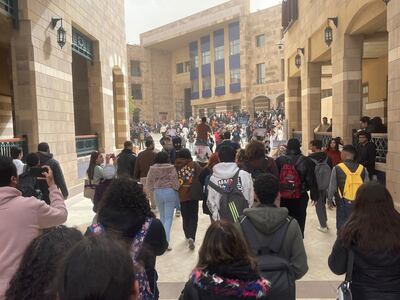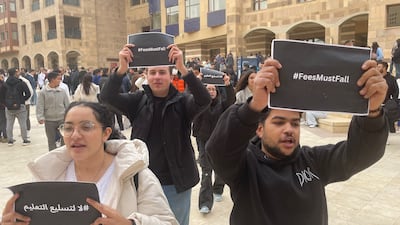Students at the American University in Cairo launched a strike on Wednesday in protest against a dramatic rise in fees.
The university, long attended by Egypt’s more affluent, requires students to pay in US dollars or their equivalent in Egyptian pounds.
Current fees to attend AUC total around $10,000 per term, which in 2021 equaled 150,000 Egyptian pounds.
Meanwhile today, following repeated devaluations, the same amount of dollars equals 300,000 Egyptian pounds.
A few students walked through the university on Wednesday afternoon holding up paper banners with slogans asking for more transparency on the university’s financial activities.
They also called on the administration to step in and ease some of the financial pressures on students.
But the strike failed to gather impetus as most the university’s students stood in the middle of its central plaza watching the strikers walk by without joining in.
Two groups on WhatsApp and Instagram organised by the strikers had a combined 2,000 members.
But only a small fraction of that number showed up, even as the strike was preceded by weeks of heated complaints from students on the university's online channels.
Drop in value of Egyptian pound
The decision to hold the strike was made on January 11, one participant told The National, when many students were shocked by headlines that the value of the local currency had dropped so far that one dollar was trading for 30 Egyptian pounds.
The pound's depreciation has left some students unable to enrol this semester, with many others transferring abroad or to more affordable local alternatives.
“There are a lot of families being negatively impacted by the rise in fees, but there’s very little the university can do," said Dr Firas Al Atraqchi, chairman of the university’s journalism department.
"The entire world is going through an economic crisis right now."
The university has repeatedly assured students that it is doing all it can to mitigate the financial burden.
"About 3,000 students — 40 per cent of the student body — do not pay full tuition," Rehab Saad, the university's spokeswoman, told The National, "They receive around $39 million annually in scholarships and financial support.
For Spring 2023, to help reduce the impact of the devaluation on our students, the university mobilised additional funds, increasing the budget by 15 per cent to reach $45 million."
This year, the university also set up an emergency tuition fund to cover some fees for students who applied before January 22.
It also said it would offer a one-time 10 per cent discount to all students who paid their fees before February 2.
Students can be eligible for more than one support mechanism, Ms Saad said.
“We recognise that all interventions will be imperfect," an email from the university to students said.
"AUC simply does not have the resources to fully mitigate the impact of the currency devaluation on all our constituents."
But several students told The National they had received no response from the university’s financial aid department about their applications.
Many said they planned to skip this term as their families tried to adjust to the worsening economic conditions.
“The university has basically stopped issuing financial aid to most students," a striker said.
"I have a friend who got $30 in financial aid after she applied. She will now be unable to attend this semester and has to find a different school."
Strikers demand more financial transparency
The small group of strikers convened outside the university’s administration building during the midday one-hour break, demanded more transparency on the university’s part with regards to “what they were doing with our money", another striker said.
They also demanded that the university remove its policy of pegging the fees to the value of the US dollar, saying most of the students are Egyptians from families who mostly earn pounds.
They originally intended to close all of the university’s classrooms and not allow students to attend lessons, but the low turnout prevented that.
The strikers' proposed a new plan for a fixed Egyptian pound-dollar exchange rate.
Seventy per cent of the fees would be collected according to the fixed exchange rate, the students said, and the other 30 per cent could be valued against the latest exchange rate.
“We proposed that they fix the exchange rate somewhere between 15 and 20 Egyptian pounds for the dollar and we are willing to negotiate on the percentages of the fees being collected,” said Hana Gad, one of the strike organisers.
At the start of their march, the small group of protesters chanted slogans directed at the administration.
But as they progressed through the campus among the hundreds of onlookers, their slogans quickly changed to attacking abstainers for their apathy.

“Why are you so quiet? Is your father a thief?” they chanted.
Prof Al Atraqchi said there were different reasons for the large-scale abstention. While some doubted that the strike would accomplish anything, others feared consequences.
“It was just badly organised. We didn’t know anything, or who was leading or anything,” one abstainer told The National.
However, a culture of class that exists among the university’s student body could have also contributed to low strike numbers, one striker pointed out.
“AUC students are known for being quite proud of going there, because it means that they come from rich families who can afford to give them the best education available,” said Farida Magdy, a student who marched with the strikers on Wednesday.
“This is why the ones whose families were able to afford the fees even after the rise didn’t participate and did not want to associate with the strikers. They think that if you can’t afford it, just leave.”
The strikers intend to continue their protest over the coming days.


